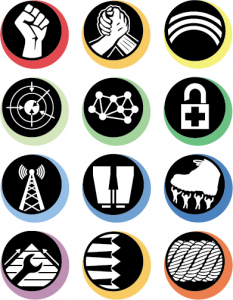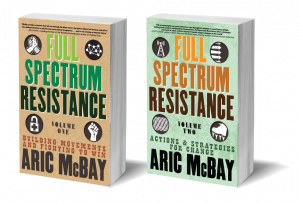We fight because the institutions of “democracy” have failed. Almost everyone recognizes that corporations have more power than people do. For a country to be “democratic” means that it is run by the people, that people are the dominant force in that society. Since corporations are the dominant force in most countries—since laws are made to suit them, and court decisions to benefit them—most countries are not, by definition, democratic. Whether a country has a representative electoral system is secondary; if a government is not accountable to the people, it is not democratic.
If we recognize this then the main debate is only about when and how that corporate power became overwhelming, and what to do about it. It’s tempting to believe that the corporate coup is a recent occurrence, and that many of our problems could be solved by “rewinding” a few decades. But is that so?
I’m going to give you three different quotes about corporate power from different years; you tell me which ones are old and which are recent.24
Number one: “The time has come to face the fact that the forces of capital and industry have outgrown the forces of government.”25
Number two: “The result (of American industrial development) is what might have been expected: an overwhelming organization of industry standing side by side with a state that is puny when compared with it.”26
Number three: “In the last thirty years we have watched the balance of power shift from the hands of the public to those of an industro-financial hierarchy . . . specialists in money making, and actuated by a rather unreflecting instinct of acquisition. . . . To change this control, to re-allocate power, is the problem of the people of the United States.”27
Okay, it was a trick question. None of these quotations are recent. They were written in 1900, 1904, and 1923 respectively. Well over a century ago it was widely recognized that corporate power had outstripped the power of the “democratic” state. (For one more, consider the words of Republican organizer Mark Hanna in 1895: “There are two things that are important in politics. The first is money and I can’t remember what the second one is.”)
We can look back even further. Corporations themselves predate the modern democratic state. They were created by aristocratic European powers as engines of colonialism, to extract resources from the colonies and to transform free and fertile continents into vast mines and plantations. In South Asia in the eighteenth century, the East India Tea Company forced farmers to grow export crops like tea and indigo instead of subsistence crops like rice. The subsequent famines killed well over ten million people. At one time, the Hudson’s Bay Company was the de facto ruler of most of Canada. Many of us were raised to see democratic governments as our protectors against corporations—it would be more accurate to say that those governments are the product of colonial corporations and of the social and economic relationships they forged.
Yes, corporate rule has worsened in recent decades, but it’s been pretty bad for a long time.
Despite the fact that so many people understand we don’t live in a genuine democracy, many people insist on pretending that we do. This is an enormous strategic mistake. This pretense may comfort people by making them feel like they have leverage, but in reality the effect is the opposite: deliberate self-delusion deprives us of the tactics we would need to get actual democracy and to effect actual change in society.
Not only have the institutions of state democracy failed, but they were never truly ours in the first place. The supposed founder of American democracy, George Washington was one of the richest men in America at the time of independence, a slave-owner unhappy that British taxes were cutting into his profits. Even the original “birthplace of democracy,” Athens, was a city where only elite male citizens could vote, and where citizens were far outnumbered by the subjugated slaves who supported them. (Indeed, Athens actually had a higher proportion of enslaved people than other “non-democratic” Greek cities.)
Democracy is not something handed down from on high or from mythical ages past, it is something that a people win for themselves.


